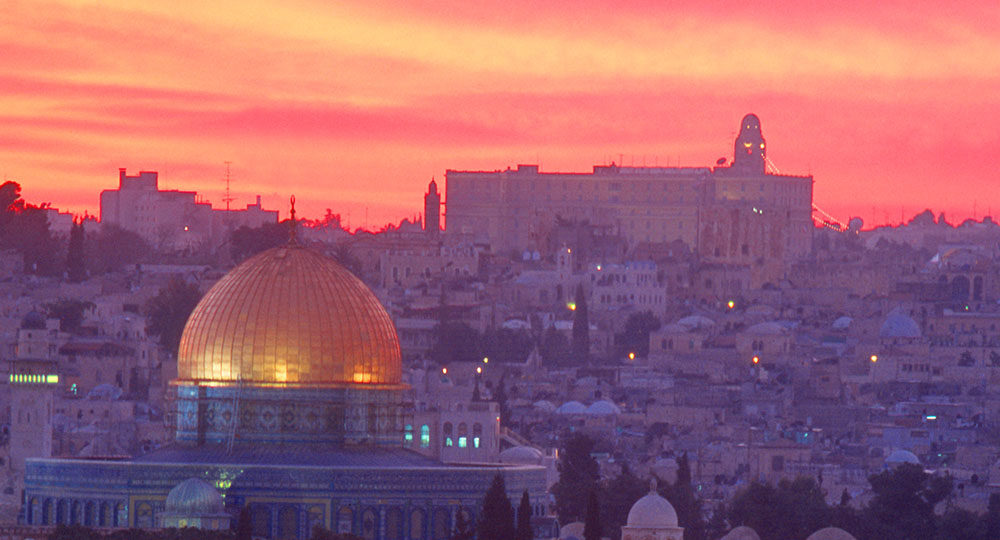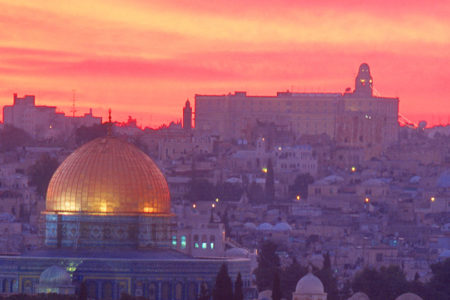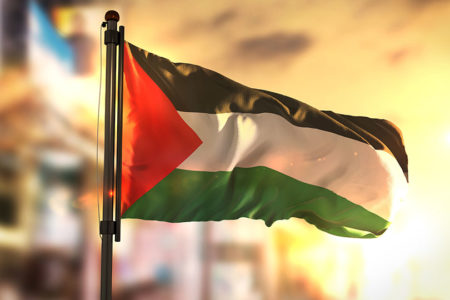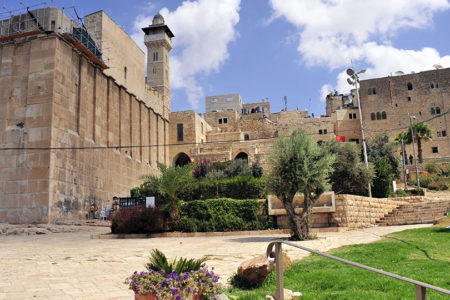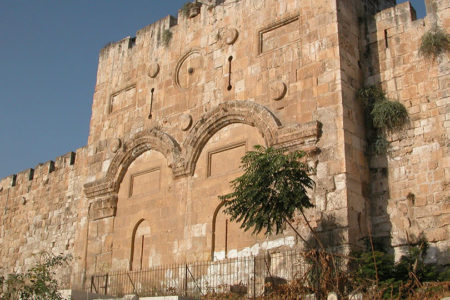Jerusalem: Occupied Territory?
“We want a piece of the action!” This seems to be the prevailing attitude when the international community talks about Jerusalem. Until the Jewish people began to wind their way back toward the Holy City late in the last century, few seemed to have much interest in the place. As a matter of fact, for all of the passion Muslims profess today about the city, an examination of history tends to dissipate some of the heat from that passion. For example, Jews have been the majority population in the city even before the massive aliyah movements of recent history. In 1845 Jews maintained a clear majority over Muslims in the city. The gap continued to widen until, by 1944, Jews outnumbered Muslims by a three-to-one margin: Jews, 92,142; Muslims, 32,039.
Even more telling were conditions found in the city when it was controlled by the Muslim Ottoman Turks. “Rags, wretchedness, poverty, and dirt, those signs and symbols that indicate the presence of Moslem rule more surely than the crescent flag itself … Jerusalem is mournful, dreary and lifeless” (Mark Twain, 1869). In the same year, Andrew Thomson expressed what he had observed of the Jewish attachment to the city: “While the Mohammedans are the masters, the Jews form the decided majority … They come in a constant stream from every part of the world … and then return to their native country; the greater number [remain in Jerusalem] that they may die in the city of their fathers, and cling to the most cherished wish of their heart by being buried on Mount Olivet; and it is remarkable that they cling with a strange preference to that part of the city which is the nearest the site of the ancient Temple, as if they still took pleasure in its stones, and its very dust were dear to them.”
Actually, the Muslim obsession to possess the City of David may be more a desire to keep it out of Jewish hands than to preserve it as a central treasure of Islam. Whatever the case, the drive to deny Jewish dominance in the city that Jews have been associated with for three thousand years does reflect Gentile desire to call the shots in the Holy City.
It is becoming clear to many observers that present maneuvering by Yasser Arafat and Palestinian leaders is meant to stake out a presence in Jerusalem that will gain what they adamantly refused in 1947. On November 29 of that year, as part of its resolution on Palestine, the General Assembly of the United Nations adopted a proposal that “The City of Jerusalem be established … under a special international regime and shall be administered by the United Nations.” After ten years, a referendum offered to residents would help ascertain whether international status should continue. History recorded the Arab response. The city was successfully attacked and for the next 19 years held by weight of arms in defiance of the U.N. decision. Then, in 1967, Israel reversed this mandate by guns occupation and seized control of their Place of Places.
Undoubtedly, the international community, encouraged by the Palestinians, will continue the pressure to roll back the clock and rescind Israeli occupation. Some form of the dual-capital concept seems now to be taken for granted. The idea is so volatile that serious discussion on the subject by Israeli leaders is like tossing a political incendiary bomb into the Knesset.
Jerusalem 3000
A few weeks ago, I walked with Zvi, our friend in Jerusalem, over a piece of Jewish hallowed ground. We were not on the Temple Mount or at Yad Vashem, the memorial to the Holocaust. Together we moved slowly over rolling terrain in an area in Jerusalem known as Ammunition Hill. In the climactic struggle for Jerusalem in 1967, there was fierce fighting at the place as Israel Defense Forces troops stormed well-fortified Arab positions. Over 50 young Israelis lost their lives in the attack. There are within the city of Jerusalem dozens of variations of the Ammunition Hill experience. All, however, direct our minds to the fact that Jewish people paid an exorbitant price for a city that had already been given to them. And with all consideration of rights aside, there was a terrible indignity about throwing life against flesh-mangling weapons of destruction in order to secure a city they had agreed to share when Jews endorsed the U.N. resolution of partition in 1947.
Asking now for Israel to return significant portions of the city for which young Jews died is hard for Jewish people to accept. And who can blame them? Why should they, or any of us, welcome the possibility of Muslims re-erecting fences between major sections of the city and putting up “Jews Not Welcome” signs? We can certainly understand how Jewish people who have lavished their love upon the city of their fathers would not wish to see their carefully nurtured parks and gardens turn to weeds and rubble.
In 1996, Israel will celebrate a love affair with Jerusalem that will have spanned 3,000 years. Since the first of David’s warriors went over the walls of the Jebusite fortress in 1000 BC, Jerusalem has endured as the religious and political capital of the Jews. On property purchased by David from Araunah the Jebusite (2 Sam. 24:18–25), her great Temples stood. Within and around the ancient city walls her sons and daughters were born and celebrated. Even during the debilitating periods when Jews were swept off the land by glowering tyrants, far-off Jerusalem held the hearts of her children, the wandering Jews.
With these irrefutable historical facts in view, we must remind ourselves once again that the Islamic faith, which is the basis of Muslim claims to Jerusalem and the land they choose to call Palestine, was not born until the seventh century A.D. In other words, the Jewish people occupied the city of Jerusalem for some 1,600 years before Islam ever saw the light of day!
Occupied Territory
Much has been made about Jerusalem being declared “occupied territory” since Israel captured the city in 1967. Many friends of Israel were appalled when the United States failed to veto the resolution declaring Jewish occupation illegal after the Hebron incident this February. It was, of course, a coup for the Palestinians and other Gentile forces who desire to share a piece of sovereignty over Jerusalem. And, on the surface, negotiating with aggrieved people may seem the civil thing to do. After all, except in the field of athletics, to win something is very much out of style today. Thus, virtually everything is negotiable in the quest to level the international playing field so there are never any winners or losers.
But let’s think about that for a moment, especially with respect to Jerusalem. This is a city that has been fought over perhaps more than any other city on earth. When Jerusalem was conquered in battle, the victors held the city until they were displaced by someone who had the strength and will to battle for possession of the place. There is a very real sense in which we can say that since the days of the Babylonians, Jerusalem has been “occupied territory.” The only question at any given time was, who happened to be the occupier, and who, on the other hand, was complaining about it? Of course, no claimant holds the biblical, historical, moral, or legal high ground regarding rights to Jerusalem as does the modern State of Israel. It would be a tragedy of the first order for the current leadership to be talked out of, in negotiations, what their enemies could not hold by military means. Furthermore, the concept of peace with strength must be the basis if there is any hope of gaining a measure of tranquility. The tendency to continually give back what aggressors have lost while attempting to exterminate a nation is, to say the least, a tenuous practice.
The Divine Municipal Planning Program
The Western world is awash in programs designed to reclaim inner-city areas suffering the ravages of time and turmoil. Indeed, the question of how to bring people back to such places has a high priority on the agenda of municipal planners. To discover the ultimate master plan for revitalizing a city, they need only look to the Scriptures and God’s program for Jerusalem. She is, we will all agree, a lady with a past—reposing with regal bearing upon the golden hills of the Judean countryside. But this city does not endure only as a relic of the past, for she stands as the literal and symbolic evidence of a better future. There is hope!
Jewry’s Better Day
“Because of thy temple at Jerusalem shall kings bring presents unto thee” (Ps. 68:29).
Scripture is replete with references to a day when the nations will be reconciled to Jehovah. Controversy over Jerusalem will be a thing of the past. As a result of Jerusalem’s tranquility, peace will flow like a river across the face of the earth. Humanity’s chief joy will be found in Jerusalem, and Jew and Gentile will mount the way to the Holy City with a harmony we can only dream of today. “In those days it shall come to pass that ten men shall take hold out of all languages of the nations, even shall take hold of the skirt of him that is a Jew, saying, We will go with you; for we have heard that God is with you” (Zech. 8:23).
A King for the Throne
“Yet have I set my king upon my holy hill of Zion” (Ps. 2:6).
When all of the thunder and tumult of the coming Tribulation have ended, the King of kings and Lord of lords will make His appearance. The warning has long since come, as in Psalm 2. Let the nations turn from their folly, lay down the implements of death and destruction, and “Kiss the Son,” because “Blessed are all they who put their trust in him” (Ps. 2:12).
A People for the King
“In that day there shall be a fountain opened to the house of David and to the inhabitants of Jerusalem for sin and for unclearness” (Zech. 13:1).
This cleansing follows the pouring out of the “Spirit of grace and of supplications”—Israel’s “look upon me whom they have pierced”—and mourning in bitterness for Him (Zech. 12:10). The picture clearly emerging is Israel reconciled, reigning, and rejoicing.
A Place of Repose
“And men shall dwell in it, and there shall be no more utter destruction; but Jerusalem shall be safely inhabited” (Zech. 14:11).
We are reminded of a verse from the Psalms that places a marvelous capstone on everything Jerusalem and her sons and daughters have endured across the millennia: “Weeping may endure for a night, but joy cometh in the morning” (30:5). It is time to turn tear-stained faces to the horizon—morning is coming!
Up For Grabs
“Behold, I will make Jerusalem a cup of trembling unto all the peoples round about” (Zech. 12:2).
The overriding contemporary issue in the Middle East is the security of the Jewish state, and the key to that security is Jerusalem.
Appraising the current situation in Israel is much like reading a page from the Old Testament prophets. Jerusalem is obviously becoming “a cup of trembling” even now the cup is beginning to boil. When Yasser Arafat, in his now-famous speech in the Muslim mosque in Johannesburg, South Africa, said, “You have to come and fight a jihad [holy war] to liberate Jerusalem, your precious shrine,” he revealed the real target of his dream of a Palestinian state.
Arafat and his Islamic cohorts are not alone, however, for the Gentile obsession to possess the Holy City is pervasive and increasingly obvious.
The Vatican rushed to establish diplomatic relations with Israel, despite serious differences on some important matters, because of its passion to exert Rome’s considerable influence when an international body begins to discuss “permanent settlement” status for Jerusalem in 1999.
The United States refused to veto an infamous resolution in the United Nations following a hysteria-driven vote after the Hebron incident. The result was that Jerusalem was declared “occupied territory”—a clear signal to all claimants that Jerusalem is up for grabs.
Israel’s Foreign Minister, Shimon Peres, recently reaffirmed Israeli determination to retain Jerusalem as the undivided political capital of Israel: “I have said that Jerusalem is closed politically and open religiously. Closed politically, meaning that the city will remain united, as it is today. Second, that it will remain the capital of Israel and only the capital of Israel—not two capitals; and third, that it will be under Israeli sovereignty. As for the possibilities, rights and needs of members of other faiths, we are open to suggestions on all sides.”
Palestinians have offered their suggestions with their feet. Faisal Husseini has for some time been conducting Palestinian business in the Orient House in East Jerusalem. The obvious implication is that this is the “government house” of the coming Palestinian state. Already Canadian government officials have met with Husseini at Orient House. One can only anticipate the Gentile world’s reaction should Arafat unilaterally declare a Palestinian state with East Jerusalem as its capital.
The pot indeed is beginning to boil—keep watching.
